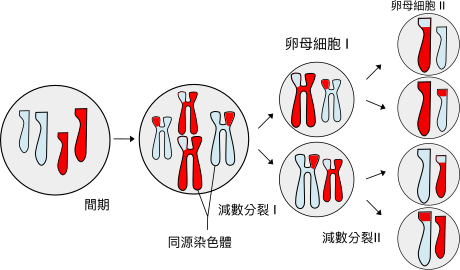meiosis

Meiosis is a special type of cell division necessary for sexual reproduction in eukaryotes. The cells produced by meiosis are gametes or spores. In many organisms, including all animals and land plants (but not some other groups such as fungi), gametes are called sperm and egg cells.
Meiosis begins with one diploid cell containing two copies of each chromosome—one from the organism's mother and one from its father—and produces four haploid cells containing one copy of each chromosome. Each of the resulting chromosomes in the gamete cells is a unique mixture of maternal and paternal DNA, resulting in offspring that are genetically distinct from either parent.























